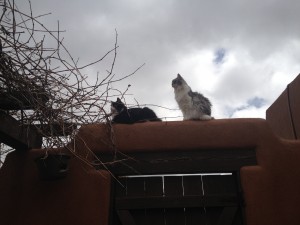 I’m at my 25th college reunion this weekend and took this pic of our iconic administration building. I’m virtually over at Word Whores, talking about my favorite kind of procrastination pleasure.
I’m at my 25th college reunion this weekend and took this pic of our iconic administration building. I’m virtually over at Word Whores, talking about my favorite kind of procrastination pleasure.
RITA ® Award-Winning Author of Fantasy Romance
 I’m at my 25th college reunion this weekend and took this pic of our iconic administration building. I’m virtually over at Word Whores, talking about my favorite kind of procrastination pleasure.
I’m at my 25th college reunion this weekend and took this pic of our iconic administration building. I’m virtually over at Word Whores, talking about my favorite kind of procrastination pleasure.
 I love this kitty queue to keep a vigilant eye on a nest they can’t quite reach.
I love this kitty queue to keep a vigilant eye on a nest they can’t quite reach.
You all know I’m on the internet pretty much all the time. I work from home for my day job, so I have my personal laptop on Twitter while I work, in case something interesting happens. For a break, I’ll pop over to FaceBook to see what’s going on. I prefer to keep up with emails as they come in, so I keep an eye on my personal email In-Box along with my work one.
I’m lucky this way. I have unfettered access to my wireless network. If something funny occurs to me, I can tweet it right then. If someone posts an NSFW link (Not Safe For Work), I can click on it. No firewall stops me. No one looks over my shoulder. When people ask me how I have so much time for social media, this is why. Sometimes I turn off the internet if I need to concentrate and can’t afford distractions, but mostly I dabble throughout the day.
So, yesterday, within ten minutes of the bombs going off at the finish line at the Boston Marathon, I saw a tweet about it. I don’t always see stuff that fast, but someone I follow happened to post it and I happened to glance right then. The company I work for is based in Boston and I have a lot of connections there, so it caught my eye.
It’s interesting to watch things ramp up, as more and more people become aware. There’s a lot of very good trading of information. There’s also expressions of thoughts and prayers. Soon the tweetstream overruns with nothing else. With a few glaring exceptions.
The tweets NOT about the unfolding tragedy begin to stand out in stark relief. They can be jarring – someone’s book release, a tweet about a fascinating thing a speaker said, a picture of a statue at a museum.
There are two things going on here: 1) people schedule tweets to post during the day while they’re at work or school or whatever. 2) people are at conferences and museums, posting interesting stuff, but paying attention to what they’re doing, not what people are saying on Twitter.
But, in the heightened emotional sea of the people who are glued to what’s going on, they see these diversions as distracting, and worse, a sign of self-absorption.
Thus the castigating began. People were posting tweets like “anyone posting promo for their book at a time like this ought to be ashamed of themselves.” A prominent publishing figure on Twitter said “People, now is the time to pull your scheduled tweets,” one I saw RT’d over and over.
Well, it’s lovely for her that she thinks it’s so easy. She is another who is online all the time and has unfettered access to the internet. A whole lot of people out there simply do not. They are not allowed to access FaceBook from work. They are behind government or private firewalls that provide security but prevent them from signing into something like Twitter. Their choices are to be silent on social media all day or schedule posts. For people working hard to promote their new book, being silent isn’t an ideal choice.
The thing is, most of the time, these scheduled tweets are invisible in the stream. They look like the same thing everybody else is saying. Only when the mass voice of Twitter shifts to something like yesterday’s tragedy, do they stand out like proverbial sore thumbs. I saw one guy comment that he hates scheduled tweets and their inappropriateness at those times makes him hate them more. My bet is that he doesn’t know which ones are scheduled most of the time. I also bet he can access the internet whenever he wants.
So, as people were dog-piling on these “selfish” tweeters, I noticed two of my friends who were going to draw negative attention. One was at a tourism conference and she was tweeting all sorts of fascinating facts. The other was at a museum, posting interesting photos of things he was seeing. Very normal for both of them, but it looked insensitive. Both are lovely, empathetic people, so I knew they had no idea. I ended up texting both of them on their phones, so they could stop – and both were grateful for the heads up.
But, I think I shouldn’t have had to do this. I think there’s a lot of room for us to be tolerant of each other. It’s easy, especially when emotions are strong and there’s nowhere to channel them, to make assumptions about people’s motivations and abilities. It seems that, especially in the face of tragedy, we could maybe give people the benefit of the doubt. Pretty much nobody is so insensitive that they’ll be chattering about their book or a conference speaker while people are posting photos of the bomb scenes. It’s clear the person doesn’t know. If scheduled tweets are continuing, maybe we can figure that the person can’t sign in to pull them. It might be good to practice assuming the best of people, rather than the worst.
Yesterday, while people were expressing despair and horror, they were also passing around this quote ascribed to Mr. Rogers:
“When I was a boy and I would see scary things in the news, my mother would say to me, ‘Look for the helpers. You will always find people who are helping.'”
And people pointed out how many rescuers – police, medical folks, runners, civilians – immediately ran to help. There are a lot of good people out there. Most of us are good people. Most of us try to be better people.
Maybe we should assume that, first.
 My office assistant, Isabel. At least she’s not on the keyboard, right?
My office assistant, Isabel. At least she’s not on the keyboard, right?
The other day, I saw this tweet:
D’ya think it’s poss to write a YA zombie book without ever having read ANY zombie books at all, like ever? Recommendations please folks?
This isn’t anyone I follow or who follows me – I saw it because someone I follow retweeted it. So, Unknown Person who asked this question by flinging it upon the waters of Twitter in good faith, if you see this, please don’t think I’m dissing you here. I had a long answer to your question. Longer than Twitter permits.
Plus I admire this person for asking the question in the first place. So very many people don’t. And I think it hurts them as writers.
See, there’s this idea that there’s an artistic purity in working from a vacuum. I’m not quite sure where it comes from. But people love to tell stories about the guy who never studied painting, ever but produces this amazing, unusual work. Or the young girl who spontaneously starts creating symphonies. We’re fascinated by the idea of this kind of genius, that seems to spring out of nowhere.
It also maybe is alluring, because we get the idea that we can skip a few steps and be successful anyway.
Really, I think this rarely happens. In fact, I suspect it never happens and stories meant to convey that idea are heavily massaged. There’s a reason interviewers ask bands about their influences, why people are forever asking writers who they read. Creativity comes out of richness, not a vacuum. Ideas lead to more ideas. Also, learning your craft means studying others who’ve gone before.
After all, no one really wants to hire an architect who says “Oh, I didn’t go to school because I didn’t want my creativity to be influenced by the establishment.” No CPA should touch your taxes who says she hasn’t read all that IRS stuff.
It’s great to want to be a rulebreaker, but you have to know what the rules are first. For a writer, that means reading. A lot of reading.
A few years back, I had a friend who was writing a vampire book. Only hers was a going to be a special vampire book – not like all the others. In fact, she’d never read a book with vampires in them. She had a fair amount of contempt for the genre. When I suggested a few books or authors who’ve greatly influenced that genre, she dismissed the idea. First of all, she didn’t want to waste her time reading books like that. Secondly, she wanted her book to be unique, untainted by the tropes. She planned to mix it up and do something Fresh, Exciting and New.
Who doesn’t want to do that?
Thing was, because she hadn’t read, she didn’t know which rules she was breaking. So, she would ask me, hoping for the benefit of all the energy I’d invested in reading those stories. I found that, not only was it difficult to answer a question about vampire nature – after all, according to which author, which tradition? Laurell K Hamilton’s vampires are not Charlaine Harris’s vampires are not Anne Rice’s vampires are not Bram Stoker’s vampires are not Stephenie Meyer’s vampires – but I resented that she wanted to write a genre she didn’t care enough about to read.
That’s what it really comes down to. If you’re writing something you don’t love to read, why the hell are you writing it?
This is a kind of literary carpetbagging. The sort of person who swoops in on the lucrative opportunity, with no real investment in the thing itself.
Not that you’re thinking that way, unknown Twitter person. Because you, at least, cared enough to ask. The short answer is sure, it’s possible to do it. There’s no guarantee for how your book would turn out if you do or don’t read. But why wouldn’t you? Take two weeks and read everything you can get your hands on. If you’re feeling the YA zombie love, then it should be a fun assignment for yourself. Spend a little time enriching yourself, creating a nice thick stew of ideas and images and emotions to draw from.
Don’t worry that you’ll be derivative or duplicating – if your creative heart is in the right place, your own story will come out of it. But do spend a little time studying the genre.
It will be an investment you’ll never regret.
 A break in the Tucson rains allowed a bit of sunset to glow on Pusch Ridge. I swear this lasted maybe three minutes. Just lovely.
A break in the Tucson rains allowed a bit of sunset to glow on Pusch Ridge. I swear this lasted maybe three minutes. Just lovely.
Funny how a brief glimpse of light and color catches our attention more than seeing the ridge brilliantly sunlit all day. I often recall a story my stepfather, Leo Kennedy, used to tell. He and some other guys were at a strip club. (Yes, this is absolutely the kind of story he would tell in mixed company. Everything in life was interesting to him.) They were sitting around a table when the waitress delivered the drinks. She bent over to set the drinks on the table and every guy leaned forward to catch a glimpse of her cleavage where her blouse gaped open. Even though there were several naked women dancing ten feet away.
He said it was an example of the hidden having more allure than the fully exposed.
He was also a former Catholic priest, so he may have told this story to encourage me to dress more demurely. At any rate, I think there’s truth in this.
This morning, I saw one of those perennial articles about how writers should handle Twitter, the balance between promo and “other” and yadda yadda yadda. I say all of this with great irony because, although the information is oft-repeated along various themes, clearly I still click on and read the articles.
It’s something we all want to know and still don’t quite understand.
I tweeted about the article (of course!) and snarked about the advice to “have a personality” on Twitter. Terrible advice, right? Terrible as in Utterly Useless. This is like your mother telling you as you leave for a party to just be yourself. Like this is such an easy thing to figure out. Especially when most of us – raging egomaniacs may be excuse from this conversation – harbor the deep conviction that “just ourselves” isn’t very interesting at all. After all, just being myself usually entails things like not wearing a bra or makeup, ignoring everyone and indulging in various bad habits. You people have no idea the lengths I go to, cleaning up my act for you.
Joking aside, most of us are grownups now and have developed, if not personalities, at least socially acceptable personae. We might not go to parties and “just be ourselves,” but we can generally get by without being hated by everyone. (Again, raging egomaniacs? we have a roped-off section in the bar for you!) But just “having a personality” doesn’t mean we know how to show it on Twitter.
The perky @AmaraRoyce, sister Kensington author, replied with:
Okay, I get the “don’t just bombard with promo” but…dammit, I have a personality! How do I show that in 140 char? 😉
And this is always the question, right?
I think it’s all about the striptease.
Twitter is, by nature, suited to the small glimpse. 140 characters is the hint of the curve of a breast through the open blouse. It’s the flash of thigh revealed by the slit in a knee-length skirt.
So, here are Jeffe’s Random Five Bits of Advice for Having a Personality on Twitter:
People like to be snarky that Twitter is all about what you ate for breakfast. It’s not, but the fun things you do – including the meals you enjoy – show who you are. And, like with sex, people are pretty much always interested in food, detractors notwithstanding. People like to hear about funny incidents or amazing sights. Think cocktail party conversation
Conversely, people are really not interested in your health problems. Even your friends, when they ask about how you’re doing with Your Horrible Disease, are asking out of concern for you and not because they really want to hear about your latest funky bowel movement. See? You flinched just reading that, right? No one wants to hear about it
A striptease is about tantalizing, about the hints and intriguing glimpses. Once people have seen everything you have to show, they lose interest. Besides, hanging it all out there is a bad idea. Twitter is not your confessional. People are not there to offer you therapy. A friend of mine somtimes comments that “such and so’s entrails are showing.” You know the image she’s thinking of – the poor wounded animal whose entrails are hanging out, and who the pack will soon turn on. Don’t rely on the kindness of strangers. If you’re wounded, go to your friends. Don’t let the others catch the scent of blood.
A little bit of complaining is okay. Heavens know Erma Bombeck made a career of it. A lot of comedians have. And that’s the key: comedy. If you can make your whine funny – especially if it’s a complaint you know a lot of people share – go for it. But be judicious. People want to be entertained by you, not depressed. It’s fine to tweet about a low moment – @AmandaPalmer did this recently and received an outpouring of support – but not non-stop. Amanda Palmer can get away with that because most of the time she’s upbeat, interesting and gives fascinating glimpses into the life of a rock star.
The things in life that give us joy and rev us up are what make us most interesting. Don’t worry about if it’s deep or will have a lasting impact on the Human Condition. If you’re happy about a new pair of shoes, tweet about it! If you’re in love with a new band, share that. I really believe that, in the end, it’s what we love most that defines us.
And, if all else fails? Just be yourself!
😉
 I arrived at the RWA conference early Tuesday morning, expressly to spend the day with my Twitter friend, Branli Caidryn.
I arrived at the RWA conference early Tuesday morning, expressly to spend the day with my Twitter friend, Branli Caidryn.
Not that Twitter is good for anything but talking about what we had for breakfast. (Blueberry pancakes, thank you – with pineapple on the side.)
At any rate, Branli, whose sci fi book, Project Horizon, will be coming out ANY MINUTE NOW, picked me up at the hotel for a day of yakking about writing and to see whales. Now, I’ve been on a few whale-watching tours in my day. (You can imagine me saying this in a wheezy voice while you pretend you didn’t see me pour whiskey into my coffee mug.) I’ve been on tours out of San Francisco, Oregon and Alaska. I’ve glimpsed some whales. I’ve seen dolphins, too.
Nothing like this.
The morning fog burned off leaving us out on the water on a gloriously sunny day. And we saw blue whales feeding. Now, it’s kind of hard to see whales because, you know, they’re under water, duh. But you get pieces of them. That I tried to capture on my iPhone 4s, without dropping it in the water. Quite the feat, I’ll have you know.
The video doesn’t capture how fabulous this was. We watched the whales feed for what felt like hours, their backs and flukes churning into sight.
On the way back to port, dolphins escorted the boat in.
Magic!
Afterwards, we enjoyed a fabulous lunch overlooking the ocean. Just the kind of thing I love.
Thank you, Branli, for a perfect day!
 I’m back from sunny, palm-tree-y California! I’m considering buying this bench and living on it. Likely the only real estate in California I can afford…
I’m back from sunny, palm-tree-y California! I’m considering buying this bench and living on it. Likely the only real estate in California I can afford…
I’ll be posting pics and doing conference gossip catch-up over the next few days. It was a great conference this year. Like the hotel in Orlando, the bar areas were beautifully situated so people could sit, socialize and catch people walking through, as well. I wonder if it’s a Disney design thing? I felt like I got to see and talk to so many people over the few days of the conference – just ideal.
And, for those of you who’ve gone in the last couple of years? That atmosphere of dread and despair has dispersed, replaced by excitement and optimism. Legacy industry “experts” were finally giving the talks they should have started giving two years ago. They’re all finally catching up to the concept that the publishing industry is not dying, it’s changing. And that these changes can be good, happy and lucrative!
Something else I learned at RWA? You folks are out there reading this blog! Who knew???
I was amazed how many of you came to the signing because you read this blog and/or Word Whores. All week people were telling me they read faithfully, but never comment. I think that’s just wonderful. Thank you for reading – and for coming by to say hi! So very fun for me.
At lunch one day, a “social media guru” told me that Twitter isn’t good for authors and you can’t sell books there because all the readers are on Facebook. I may have laughed in her face, but at least I didn’t spit out my salad. When someone tells me something like that, I immediately know they don’t understand how Twitter works. Are “BUYMYBOOK BUYMYBOOK BUYMYBOOK” tweets effective? Hells to the no. Have I met all kinds of people on Twitter who I consider friends and part of my support network, who talk about my books and recommend my reads? Oh yes, yes, yes.
In fact, not to bury the lead or anything, but I have news along those lines: I have an agent offer! And it started on Twitter.
About a week before RWA, someone I’ve been following for a long time on Twitter, DM’d me (direct message, which is private, for those not in the know) and asked if I was represented yet. She’d been reading some of the book blogger reviews and conversations about Rogue’s Pawn. Plus, another of her clients suggested me (thank you, dear!). We set up a time to talk at RWA, along with one of her senior agents, and she made the offer.
I know this should be the SQUEEE moment, but it’s funny – though I’m excited about the future, this feels very much like a business decision at this point. This was my 5th RWA conference. Amazing for me to consider, but five years ago, I flew to the RWA conference in San Francisco, where I knew not one person, pitched to an agent and an editor, and flew home again. I’ve learned and grown so much in that time. The agents I talked to this year asked if I thought I could keep up, if they got me a contract for a new trilogy, along with the other series I have going. I was able to say, with confidence, yes. Yes, I can.
Something I would not have known – and likely could not have done – five years ago.
So, right now I’m in the process of contacting the four agents who’ve had the full of the new novel for a while now. If any of you don’t know this, mark this well: if you receive an agent offer, you must attempt to contact any other agent who’s requested materials from you. This is a basic business courtesy. I know writers who have not done this and people were angry about it. They won’t forget, either. A lot of writers change agents along the road. Never burn your bridges. PSA over.
One agent “revisited” the book that night. One is so swamped she gracefully “bowed out of the race” with good wishes. Two more haven’t replied and I suspect they’re reading. It confirms what I often suspected: they request the manuscript from you, but often sit on it, in favor of more urgent tasks, until a request like this moves it up the list for them.
But, I really like the agent who offered already – and I really like the agency and the agency agreement. I also love that she’s an active blogger, available on Twitter and understands the digital world in the same way I do.
Stay tuned!
 This was smoke from the Gila fire drifting our way Friday evening. Fortunately the cooler air over the weekend subdued the fire quite a bit.
This was smoke from the Gila fire drifting our way Friday evening. Fortunately the cooler air over the weekend subdued the fire quite a bit.
When I was in college, I imagined sometimes that a TV or movie camera was following me around. For a long time I thought this was a weird thing about me, weird enough that I never told anyone. Later I discovered it has a lot to do with my personality type and a tendency to view my actions from a certain remove. I’d especially do this when I was trying to learn something new.
For example: studying.
In high school, I never really learned to study. Memorization felt pretty much effortless. If I heard or read something once, I retained it. With the possible exception of calculus, but I had a bad attitude there. In college, however, the sheer volume of information meant I had to work at learning and memorizing – and I had no idea how to go about it.
So, I kind of did it like in the movies. I went to the prettiest libraries on campus. I set out my books and supplies. I did everything I could think of to look like I was studying – perhaps a romanticized version of it, but still – and hoped that would do it.
Of course, this was silly. Creating an external appearance does not create an internal process. That took a different level of effort. One that had nothing to do with how I looked from the outside. It’s akin to the temptation to talk about a thing instead of doing it.
This has been on my mind because I notice writers doing this, especially newer ones. Social media creates the venue for the “look at me!” moments. And the support network is great for staying motivated and not feeling like you’re working in a vacuum. However, writers are especially prone to talking about writing instead of doing it. Ostensibly, waxing on about your plot and characters is giving you a chance to think about the story, but every moment you’re talking about it instead of doing it, you’ve lost time. That includes tweeting about it.
I’m kind of amused by the #amwriting hashtag on twitter. Not that it isn’t a useful way for writers to connect. It’s just that, every time I see it, I want to reply “really, you’re #amtweeting.”
My point is, all of these internal processes – writing, studying, learning – occur where no one else can see, deep inside the locked box of our skulls. What someone else sees when they look at you is totally irrelevant.
Magic occurs in the dark, without witnesses.
Full moon in the Caribbean. Yeah – it was pretty fabulous.
So, this week I am the “voice” of Carina Press on Twitter.(@carinapress)
I know, I know – what the hell was Angela James thinking?? You just don’t put power like that into the hands of an irreverent smart-ass like me. Of course, I have managed not to discuss the plight of iguanas so far…
At any rate, she’s been trying an experiment of having different authors take over the Twitter feed for a week at a time. Apparently Sweden does this – gives the feed to a different citizen each week. It sounds like this has been going well for the Carina feed, so it will continue from here on out.
When Angela first contacted me about doing this, I was all pleased and flattered. And excited, too. After all, I love the Twitter. “Being” Carina Press for a week sounded like crazy fun. I watched the three gals who went before me and paid attention to what I thought worked and what I’d do when it was my turn. Then, yesterday, it was MY chance!
And I got all quiet.
Somehow, representing someone ELSE, someone CORPORATE, brought the responsibility slamming home. No longer could I romp carefree through Twitter – though I like to think I’m reasonably careful about what I say. At one point I meant to say something as me, and inadvertently Tweeted it as Carina. Fortunately it wasn’t bad. But I’ve seen people retract tweets before, saying they sent it from the wrong account and I’d thought, jeez, how hard is it, people? Harder than I thought, turns out! I swear I had the account tagged and then the application sent it as the other. Eep
So, at one point, I did send a much more off-color remark to author Shannon Stacey (@shannonstacey), who had the feed last week. I *very* carefully sent it as me. She replied, asking me how many times I checked which account I was sending from before I hit the button.
My answer? Seven.
I tell you what, this responsibility thing is a terrible burden!
It’s one thing to be responsible to myself and another to represent a whole group of people I respect and admire. But I also know – and have reviewed the guidelines! – that Angela wants our personalities to be part of this. To infuse the Carina feed with who we are. After all, Twitter is better suited to people, with their quirks and errors, than to carefully robotic corporate messages.
And if I say the wrong thing, or from the wrong account, eh – it’ll only be saved by the Library of Congress, in perpetuity.
No pressure.
A few weeks back, I was cleaning up the garden for winter (which turns out to be a good thing because we’re in full-blown blizzard conditions right now) and I managed to gouge my hand on a garden stake. Right in the center of my palm. It wasn’t a bad scrape, but it looked unsettlingly like a stigmata.
Naturally, being a Twitter junkie, I tweeted about my new stigmata (stigmatum?) and dubbed myself #HolyJeffe.
I have it on good authority that several people took up the epithet and used it in good health.
Now, a number of people asked if they should worship me, which is just wrong, wrong, wrong. No, I said, you should worship that which gave me the stigmatum (“stigmata” sounds better), from whom all holiness flows. The garden stake.
Being in The Netherlands, Sullivan McPig, somewhat anxiously inquired if any garden stake would do. I had to deliver the bad news that, while all garden stakes are images of the One, True Garden Stake and one should always express courtesy and reverence towards them, that only the One, True Garden Stake would do for offerings.
Being the generous soul that I am, I agreed to be a conduit for all such offerings.
Holy Jeffe cares about you.
So, Sullivan, and his cohort, Voodoo Bride, who does book reviews here, got their owner to send tribute to the One, True Garden Stake.
It was acceptable.
Delicious, too.
Good Sinterklaasavond to Sullivan, Voodoo Bride and Carien and her partner today!

This morning, as I ran on the treadmill, I saw a woman step out of the Spin class in the shop next door. She’d bundled into her parka, had her hat and gloves tucked under her arm and held her smartphone in the other. Reading some message on the phone, she smiled, pleasure suffusing her face.
I like that about seeing people texting and tweeting and messaging on their various handheld devices. It’s kind of replaced the old pastime of watching people greet each other at the airport, the hugs, squeals and laughter. People’s faces respond to the messages, making the same expressions they’d use in a face-to-face conversation. They grin. Sometimes they laugh out loud.
It’s not always the frowning and blankness detractors like to cite.
Marcella taught an online class recently on using acting devices in writing. She asked me to read over a description of a “left turn” that she wanted to use as an example. Here’s her lesson:
You’ve gone out for the evening, you and your spouse. It’s the first nice dinner you’ve had since the birth of your child. Dinner was relaxing. You actually got to have a glass of wine. You engaged in adult conversation. It was lovely. When you get home, the babysitter greets you at the door with a smile saying everything went fine. The baby is asleep. Looked in not ten minutes ago. You pay the sitter and she hops in her car for the short drive home. You sigh, content, as you and your spouse make your way upstairs to look in on the baby before getting ready for bed. Except, the nursery is still. Silent. Your heart stutters. You reach down to touch the infant. Cold. No breath. No life.
How do you react?
This was an acting scene set up. It isn’t real. Not here. Not today. Shake off any residual emotion, then come back with your response. When I asked, “how do you react?” What was your first, gut response? To scream? That impulse is the most common response to this exercise. It’s expected, which means it’s also a little trite as far as emotional reactions go. This is the point at which a director yells, “Take a left!” meaning, don’t go for the easy reaction. Do something fresh.
We’re not? here to talk about how to find the unexpected actions and emotions in scenes, but actions and emotions that ring true on a gut level for you and for your reader. In the scene set-up above, the actress playing the part turned to the man behind her, all the breath rushing audibly from her lungs, and began pounding her fists against his chest as he stood staring at the crib.
I’m Marcella Burnard. I write science fiction romance for Berkley Sensation. I also spent three years in the acting conservatory at Cornish College of the Arts, which resulted in a BFA in acting. It was there that one of our teachers gave us this scene as a way to introduce text analysis so that we could break down a scene, moment by moment, identify what the people in the scene want (their objectives) and then decide how each person goes about getting what they want (their tactics).
This idea stuck with me, that it can be fruitful for characters to behave in an unexpected way, to take a left turn instead of a right. (A recurring conversation during Christmas was that UPS and Fed Ex drivers are instructed to use only right turns, never left – urban myth or no?) I loved this example of a left turn – a simple thing that instantly enriches the characters and deepens the story.
It’s easy to write about people frowning at their Blackberries, to describe the unsettlingly blank expressions of teens absorbed with the iPhones. Seeing that woman’s smile this morning gave me ideas for ways to show all kinds of character from the one-sided silent conversations people have all around us.
Also? We followed a Fed Ex truck and it totally turned left. It’s all around us.